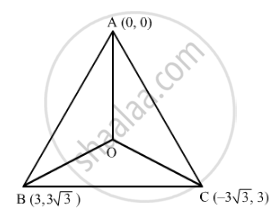Advertisements
Advertisements
Question
If in a ∆ABC, A = (0, 0), B = (3, 3 \[\sqrt{3}\]), C = (−3\[\sqrt{3}\], 3), then the vector of magnitude 2 \[\sqrt{2}\] units directed along AO, where O is the circumcentre of ∆ABC is
Options
- \[\left( 1 - \sqrt{3} \right) \hat{i} + \left( 1 + \sqrt{3} \right) \hat{j}\]
- \[\left( 1 + \sqrt{3} \right) \hat{i} + \left( 1 - \sqrt{3} \right) \hat{j}\]
- \[\left( 1 + \sqrt{3} \right) \hat{i} + \left( \sqrt{3} - 1 \right) \hat{j}\]
none of these
Solution

\[\begin{array}{l}| \overrightarrow{AO} | = 2\sqrt{2} \\ | \overrightarrow{AO} | = | \overrightarrow{BO} | = | \overrightarrow{CO} | = 2\sqrt{2} = R \\ \text{ Let the position vector of }\text{ be }x \hat{i} + y \hat{j} . \\ | \overrightarrow{AO} | = \sqrt{x^2 + y^2} \\ \therefore x^2 + y^2 = 8 . . . . . (1) \\ \text{ Also, }| \overrightarrow{BO} | = | \overrightarrow{CO} | \\ \sqrt{\left( x - 3 \right)^2 + \left( y - 3\sqrt{3} \right)^2} = \sqrt{\left( x + 3\sqrt{3} \right)^2 + \left( y - 3 \right)^2} \\ x^2 - 6x + 9 + y^2 - 6\sqrt{3}y + 27 = x^2 + 6\sqrt{3}x + 27 + y^2 - 6y + 9 \\ y\left( 6 - 6\sqrt{3} \right) = x\left( 6\sqrt{3} + 6 \right) \\ y = \frac{x\left( 1 + \sqrt{3} \right)}{\left( 1 - \sqrt{3} \right)} . . . . . (2)\end{array}\]
Substituting y from (2) in (1) we get,
\[\begin{array}{l}\left( 1 - \sqrt{3} \right)^2 x^2 + \left( 1 + \sqrt{3} \right)^2 x^2 = 8 \left( 1 - \sqrt{3} \right)^2 \\ x^2 \times 8 = 8 \left( 1 - \sqrt{3} \right)^2 \\ x = 1 - \sqrt{3} \\ y = 1 + \sqrt{3} \\ \therefore \text{ The position vector of O is }\left( 1 - \sqrt{3} \right) \hat{i} + \left( 1 + \sqrt{3} \right) \hat{j} \\ \overrightarrow{AO} = \left( 1 - \sqrt{3} \right) \hat{i} + \left( 1 + \sqrt{3} \right) \hat{j}\end{array}\]
APPEARS IN
RELATED QUESTIONS
Find the magnitude of two vectors `veca and vecb`, having the same magnitude and such that the angle between them is 60° and their scalar product is `1/2`.
If `veca` is a nonzero vector of magnitude 'a' and λ a nonzero scalar, then λ`veca` is unit vector if ______.
If `veca, vecb, vecc` are mutually perpendicular vectors of equal magnitudes, show that the vector `veca + vecb+ vecc` is equally inclined to `veca, vecb` and `vecc`.
If `veca, vecb, vecc` are mutually perpendicular vectors of equal magnitudes, find the angle which `veca + vecb + vecc`make with `veca or vecb or vecc`
Represent the following graphically:
(i) a displacement of 40 km, 30° east of north
(ii) a displacement of 50 km south-east
(iii) a displacement of 70 km, 40° north of west.
Find the magnitude of the vector \[\vec{a} = 2 \hat{i} + 3 \hat{j} - 6 \hat{k} .\]
Find the unit vector in the direction of \[3 \hat{i} + 4 \hat{j} - 12 \hat{k} .\]
A vector \[\vec{r}\] is inclined at equal angles to the three axes. If the magnitude of \[\vec{r}\] is \[2\sqrt{3}\], find \[\vec{r}\].
Define "zero vector".
Write a vector of magnitude 12 units which makes 45° angle with X-axis, 60° angle with Y-axis and an obtuse angle with Z-axis.
Write the length (magnitude) of a vector whose projections on the coordinate axes are 12, 3 and 4 units.
Write two different vectors having same magnitude.
Write a vector in the direction of vector \[5 \hat{i} - \hat{j} + 2 \hat{k}\] which has magnitude of 8 unit.
Find a vector \[\overrightarrow{a}\] of magnitude \[5\sqrt{2}\], making an angle of \[\frac{\pi}{4}\] with x-axis, \[\frac{\pi}{2}\] with y-axis and an acute angle θ with z-axis.
Prove that in a ∆ABC, `sin"A"/"a" = sin"B"/"b" = sin"C"/"c"`, where a, b, c represent the magnitudes of the sides opposite to vertices A, B, C, respectively.
The magnitude of the vector `6hat"i" + 2hat"j" + 3hat"k"` is ______.
The vector in the direction of the vector `hat"i" - 2hat"j" + 2hat"k"` that has magnitude 9 is ______.
Let `vecalpha = hati + 2hatj - hatk, vecbeta = 2hati - hatj + 3hatk, vecγ = 2hati + hatj + 6hatk`. If `vecalpha` and `vecbeta` are both perpendicular to a vector `vecδ` and `vecδ. vecγ` = 10, then the magnitude of `vecδ` is
If the sum of two-unit vectors is a unit vector, then the magnitude of their difference is
Which of the following statements is false about forces/ couple?
In a triangle ABC three forces of magnitudes `3vec(AB), 2vec(AC)` and `6vec(CB)` are acting along the sides AB, AC and CB respectively. If the resultant meets AC at D, then the ratio DC : AD will be equal to :
Find a vector of magnitude 20 units parallel to the vector `2hati + 5hatj + 4hatk`.
Find a vector of magnitude 9 units and perpendicular to the vectors.
`veca = 4hati - hatj + hatk` and `vecb = -2hati + hatj - 2hatk`
